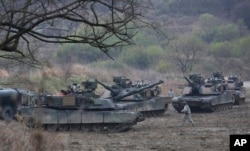Despite Kim Jong Un's repeated provocations and willingness to engage in heated rhetoric, top U.S. intelligence officials say the North Korean leader is not crazy.
"Kim Jong Un is a very rational actor," the deputy assistant director of the Central Intelligence Agency's Korea Mission Center said Wednesday.
"Bluster and rhetoric aside, Kim Jong Un has no desire to go toe to toe with [U.S. and South Korea's] combined forces command," Yong Suk Lee said at a CIA-sponsored intelligence conference in Washington.
"Kim Jong Un wants what all authoritarian rulers want ... to rule for a long time and die peacefully in his own bed," Lee said.
At odds with Trump view
The intelligence assessment would appear to run counter to the rhetoric being used by U.S. President Donald Trump.
In a series of tweets, Trump has referred to the North Korean leader as "Little Rocket Man," and, in one tweet last month, said Kim Jong Un was "obviously a madman."
Lee and other CIA officials, however, believe there has been a "clarity of purpose" to the way the North Korean ruler is acting on the world stage.
Pyongyang's goal, they say, is to gain recognition as a major nuclear power and eventually negotiate a deal with the United States that sees American forces leave the Korean peninsula.
Intelligence officials see North Korea's repeated nuclear and missile tests as a way to create some space and give Pyongyang room to maneuver as it pursues its goals on the peninsula.
"He wants to keep us out of his sandbox," Lee said, predicting another test or provocation could be coming as soon as October 9, which marks the founding of the country's ruling political party, as well as the Columbus Day holiday in the U.S.
Risk of miscalculation
But current and former officials worry about the risk of miscalculation by Pyongyang.
"They're not suicidal," according to the former U.S. special envoy for Six-Party Talks with North Korea, Joseph DeTrani, who warned that Pyongyang was playing a risky game, especially as the White House has ruled out any meaningful talks with the North Korean regime.
"We could stumble into conflict," DeTrani said. "They're hearing from the president of the United States unfiltered [via Twitter], so this has to have significant impact."
There are also questions about what role China is willing to play.
"China itself is wrestling with concerns about instability on its border, but at the same time is also trying to establish a stable relationship with the United States," said CIA Deputy Assistant Director Michael Collins.
"There is more China could do," Collins said. "What effect that will have on Kim Jong Un's calculus is a different matter."
China's influence
Officials also say U.S. efforts to work with China have been hampered by Beijing's own global strategy, which is aimed at frustrating the United States and limiting Washington's influence in areas when the two countries do not see eye to eye.
There are some indications Beijing's influence over North Korea's Kim Jong Un is limited.
"He's not afraid of China's abandonment. He's not afraid of a U.S. strike," said the CIA Korea Mission Center's Lee.





